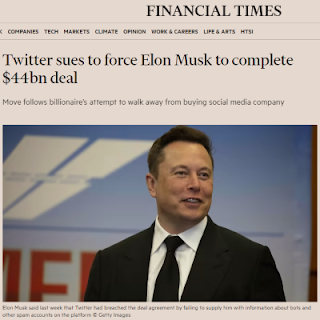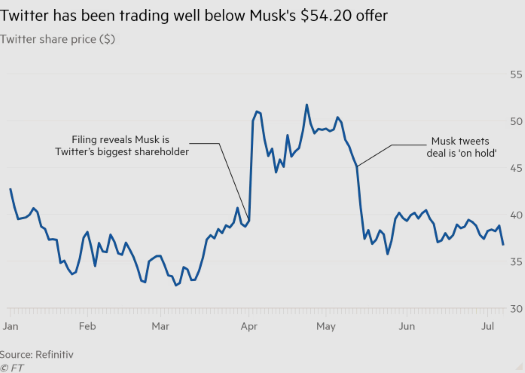This means a legal battle over whether to enforce the agreement.
In this blog piece, I would like to briefly outline how Elon Musk would fare if the corporate acquisition was governed by English law.
✲✲✲
Introduction to the Takeover Panel & "Material Adverse Change" Clauses
In the UK, public takeovers are regulated by the Panel on Takeovers and Mergers ("Takeover Panel"). Following the Companies Act 2006, the Takeover Panel became a statutory authority. But before then, it was established in the late 1960s as an independent body – encouraged by the Governor of the Bank of England and the Chairman of the London Stock Exchange – that produced guidelines and rules & behaved as a regulator of takeovers in the UK. Currently, the Takeover Panel consists of up to thirty-six members from leading financial and business organisations.
The main function of the Takeover Panel is to issue and administer the City Code on Takeovers and Mergers ("Code") which aims to promote and achieve equality of treatment and opportunity for shareholders in a takeover bid. It aims to prevent underhanded and unfair tricks and tactics that hurt shareholders and promote integrity in the UK's financial market.
Before moving into the law, it is useful at this juncture to define a technical term applicable to this subject . Material Adverse Change clauses ("MAC clauses") allow an offeror to walk away from a merger and acquisition ("M&A") transaction after parties have signed the merger agreement but before the transaction has been formally closed.
✲✲✲
Principle against "false markets" & rule 13 (conditions in M&A agreements)
In the Code, the fourth principle explains that the Takeover Panel seeks to avoid the creation of "false markets" and, accordingly, limit the ability of an offeror to withdraw from the transaction. In company law, "false markets" are understood as the inflated or depressed swings in the underlining price of a security brought on by erroneous or inefficient information.
The fourth principle says: (Link)
False markets must not be created in the securities of the offeree company, of the offeror company or of any other company concerned by the bid in such a way that the rise or fall of the prices of the securities becomes artificial and the normal functioning of the markets is distorted.
Additionally, and more specifically, rule 13 of the Code relates to conditions in the M&A agreement. Rule 13.5 says:
An offeror may only invoke a condition or pre-condition so as to cause the offer not to proceed, to lapse or to be withdrawn with the consent of the Panel. The firm offer announcement and the offer document must each incorporate language which appropriately reflects this requirement. The Panel will normally only give its consent if the circumstances which give rise to the right to invoke the condition or pre-condition are of material significance to the offeror in the context of the offer. This will be judged by reference to the facts of each case at the time that the relevant circumstances arise. (Emphasis mine)
The effect of Rule 13.5 is that the Takeover Panel can determine whether the offeror can exit a transaction if the issue is "of material significance".
✲✲✲
Conclusions about Elon Musk
Firstly, as can be seen in the graph below, the Elon Musk's offer to buy Twitter & subsequent withdrawal clearly created a false market. Additionally, the nature of Elon Musk's very public pronouncements and broadcasts exposes him to the dos-and-don'ts of corporate disclosures. Thus, under English law, I would think that his public pronouncements had the effect of contravening the principles of the Code vis-à-vis creation of false markets and potential disclosure liabilities.
Secondly, the question is whether Elon Musk's concern about the number of bots and fake accounts amounted, as he said on Twitter, to a "material breach of multiple provisions". In contrast, Twitter has maintained that the bot figure stands at 5%. Assuming that Twitter's figure is incorrect, in point of fact; it is worth asking whether bots at 5%, 10%, 25%, 35% etc… have any bearing on Twitter's cash flow, earnings, and balance sheet.
I am aware that Prof. Aswath Damodaran is a recent proponent of users-based valuations in DCFs and general corporate theory. Nevertheless, from my point of view, this theory seems a bit unsafe and doubtful; and so, presently, I would prefer to anchor valuations in more "traditional" corporate earnings only. Indeed, MAC clauses are designed and calculated to offset changes in the economic prospects of the company after the signing of the agreement. To my mind, Elon Musk would have to show deterioration in the business, assets, and financial position etc… of Twitter.
So, wrapping it all up; I would argue that Elon Musk's very public pronouncements of the Twitter takeover, and his purported justification for withdrawing are probably insufficient in English law to warrant the Takeover Panel suspending the takeover.


No comments:
Post a Comment